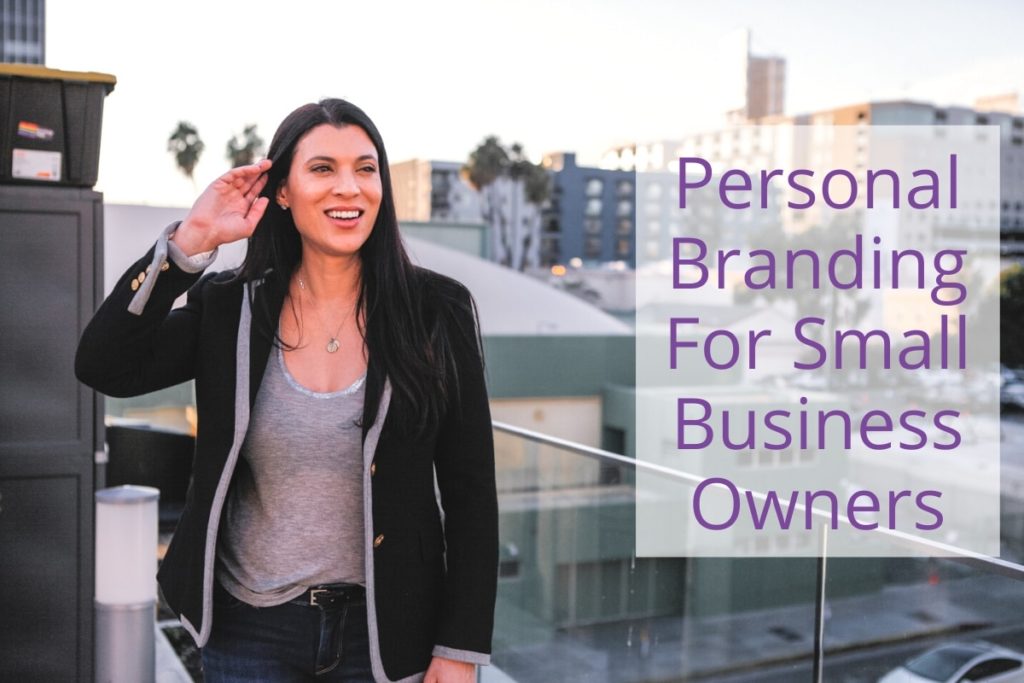If I had a dollar for every time people wanted to know the difference between a personal brand vs a business brand, that could just be my entire business!
But really— I understand why these two concepts give people pause. Aren’t they the same thing?
One of the main reasons this question comes up a lot more now than it used to is because of influencers. You may have noticed that these mini-internet celebrities will refer to their YouTube channel or blog as their “brand.” Compared to well-known brands like Starbucks or Marvel, it’s no wonder that the term can be a bit jarring.
As a personal branding strategist, my job is to work with individuals on their business. I don’t work with big (or small) branded companies who aren’t associated with any one individual.
While it may seem that being a strategist for big corporations would present more opportunities for me as an entrepreneur, it’s actually quite the opposite. Today, people are gravitating toward personal brands over business brands which means more clients for me and more room for my own businesses to grow.
If you are a small business owner, you may be struggling with the decision to make your business a personal or business brand. I’ve also had to ask myself this question over and over again throughout my years as a branding expert.
If you’re still stuck on how you want to move forward and present your brand, it will be important to know the differences between a personal brand vs a business brand.
So let’s dive in.
RELATED: What Is Social Media Branding?
What is Your Personal Brand?
Let’s start by understanding what a brand is. According to the Dictionary of Brand, a brand is:
“a person’s perception of a product, service, experience, or organization.”
Now, extrapolate that to your personal brand and your personal brand is “how you are perceived by others.”
Essentially what this means is that a personal brand is who you are and what you represent as a person. This means that your opinions, perception, and advice are detrimental to how your brand operates. It also means that those opinions, perceptions, and advice will be evaluated by your audience under a very large magnifying glass.
That seems like a lot of pressure, right? So why do some small business owners choose to go with a personal brand vs a business brand?
Gary V’s answer is one of my favorites. He talks about how a personal brand doesn’t limit how far you can stretch as an entrepreneur. You may start your business off as a lifestyle blogger (like I did), but if your passions change, so can your personal brand.
That’s actually what I did. After my fire for sharing gluten-free recipes died down, I turned to my life-long passion: branding. Now I write and teach entrepreneurs about building their personal brand. And while that may have caused some people to drop off in the process, my core audience has stuck around because they want to see my journey and because they simply like what I have to say.
Besides the fact that your personal brand can evolve as you yourself grow, the reason people choose to become a personal brand is because of the like, know, and trust factors.
RELATED: How to Grow Your Business on Instagram in 2020
Like, Know, and Trust of Personal Branding
What do I mean by like, know, and trust?
These are the emotions wrapped around a personal brand the make it valuable. If you have built an audience that succumbs to each of these factors, your personal brand is undoubtedly successful.
People need to like you as a person before they will be willing to buy from you. How can you make them like you? By letting them get to know you. Once you have opened up and expressed a vague sense of vulnerability, people will be able to trust you.
And all of that will turn your audience into loyal followers, clients, or customers.
Like
It’s no secret that consumers are more willing to make purchases based on reviews and recommendations. That’s why many corporate business brands are turning to online influencers to promote their product or service. These influencers have that sense of likability, so they are able to leverage their separate personal brand to make sales.
Building your own likable personal brand makes it so that you don’t have to rely on others to promote your product,
Know
You don’t have to be a celebrity or a well-known social media star in order to check off that “know” aspect of your personal brand.
What you do need to do, is show up for your audience. That means sharing your expertise, being present online, and providing value to your ideal client so that they can get to know you enough that they begin to trust you.
Trust
Another way to look at your personal brand is by determining what the underlying factor is that makes someone ultimately trust you enough to work with you (or buy whatever you’re selling).
Therefore, a personal brand is not a logo, a brand identity, a mission statement, a website or even your social media channel. Those add to your personal brand, but by themselves, they are not the personal brand.
If you can generate a product, a service, and a persona that proves to be helpful again and again, that’s when you know that you’ve built a personal brand that people can trust.
Examples of Personal Brands
It’s important not to confuse personal brands with just online influencers. You can be the CEO of a corporate company and still have your own personal brand.
For example, Elon Musk has his own personal brand. But what came first, Musk or Tesla?
Musk propelled his endeavors by advertising himself as an entrepreneur out to change the world. Therefore, all of his businesses — from Tesla to SpaceX — are tied to his personal ideology which has helped these companies succeed. People began to like, know, and trust Musk enough that the press started to write about him and investors became more than willing to invest in him.
That’s the power of a personal brand.
Some of my favorite examples of successful personal brands are Rachel Hollis and Amy Landino. Both of these female entrepreneurs have built a strong community around their niche. Enough so that not only are they widely recognizable, but their business has grown past their own viral recognition to the point where they have multiple streams of revenue, their own team, and limitless opportunities.
The Story Behind My Personal Brand – Claire Bahn
I explained How I Started my Business From Scratch in another blog. In short, the website you are reading from now used to be littered with all the traits of a professional lifestyle blogger. I wrote reviews on 5-star California hotels, I doled out recipes for my favorite cocktails, and I built an online personal brand as me, Claire Bahn, so that I could share each of these passions with my audience.
Over the past year or two, however, those passions began to change. At first, this seemed terrifying. My entire social presence was built on my lifestyle brand and transitioning into being a personal branding strategist (despite the fact that it has been my day job for years) seemed like an easy way to ostracize my readers.
But that is the beauty of having a personal brand. As Gary Vaynerchuk said, he used to talk non-stop about wine on his social channels. Now, he gives daily advice on entrepreneurship because he stuck with his personal brand (@garyvee) from start to finish. He was able to bring in his loyal followers on each step of his entrepreneurial journey, and that was possible because his audience likes, knows, and trusts him.
That’s what happened to me. I have built my brand around myself, Claire Bahn, which has not only allowed me to experiment with my different interests, but it has led me to other business opportunities like building Stratus Branding.
Personal Brand Vs. Business Brand – Which One Should You Choose?
If you are still debating on whether your company should be personal brand vs a business brand, here’s a simple answer for you:
There’s more room to grow with your personal brand and there are more opportunities within a personal brand.
In short, go with the personal brand.
You can always do a combination of the two, but you need to make sure you are present in some way. If you’re the CEO of a corporate brand, you can still pivot and become a personal brand. Entrepreneur Magazine says, “One report from the Impact Learning Center found that consumers are 82 percent more likely to trust a company if the CEO is active on social media.”
Personal brands are heavily scrutinized by others because they want to know that they can trust the person behind the brand. This puts an immense amount of pressure on you as a business owner, and I’ll admit, it’s not for the faint of heart.
How you are perceived by others is going to be the catalyst behind the success of your company. What will someone find when they research your personal brand? Do you have an online presence, press coverage, or free advice that you lovingly give to those in need? Or are you charging blatantly upfront without enough of a persona out there to get people to know you or what your business has to offer?
Why A Business Brand Didn’t Work For Me
My first company was Online Profile Pros. I have been on the leadership team for this company for nearly a decade. We did everything you’re supposed to when you build a company: we defined our mission statement, we developed a logo and a website, and we built a marketing plan that became profitable for us and our clients.
But here’s the thing.
The corporate business brand model that OPP has held for all these years hasn’t been working. Not as well as it used to, at least.
I know that the reason for this is because there is no identifiable persona behind Online Profile Pros. Who is the person giving profile and dating advice? One person? A team of people? How can you trust this company without knowing anything about them?
That’s why my team and I recently decided to give this company a personal brand— me.
I use my long-term relationship with OPP and my Claire Bahn personal brand to put a face to the name. Online Profile Pros is recognized as its own entity with its own logo, website, and mission statement. The same has been done with my company, Stratus Branding. Each of my companies can stand on their own, but I bring in a touch of personal branding by being the face behind the names of these companies.
And it’s okay if your personal brand is tethered to more than one entity. In fact, as your personal brand grows, it should give you that leverage to dip your toes into multiple business ventures. Just look at Gary V with Wine Library and VaynerMedia, and Elon Musk with Tesla and SpaceX.
RELATED: What Is Social Media Branding?
Why People Trust Personal Brands More
A business brand is defined by its logos, colors, and products. You can build a recognizable business brand with a faceless identity, but this is steadily becoming an old hat tactic.
The reason people trust personal brands vs business brands is simple: it’s just more personable.
Claire Bahn giving advice as a seasoned personal branding strategist is going to reside with potential clients a lot more than the Stratus Branding website doing the same thing.
Any advertising done for Online Profile Pros or Stratus Branding is done with my face, my voice, and my personal brand. The dating coach sessions we offer on OPP come directly from me. The personal branding coach you get with Stratus Branding is me. And you know that because I am largely present on each of these companies’ entities.
Trusting a personal brand is similar to getting advice from a friend. The way most personal brands present their ideas is in a natural and organic manner. It doesn’t feel forced, it doesn’t feel sales-y. The content a personal brand produces speaks directly to the customer, and the customer actually listens because you are the authority.
Credibility and relevance are the basis of many purchasing decisions. And that, to me, is what makes a personal brand the obvious choice.



